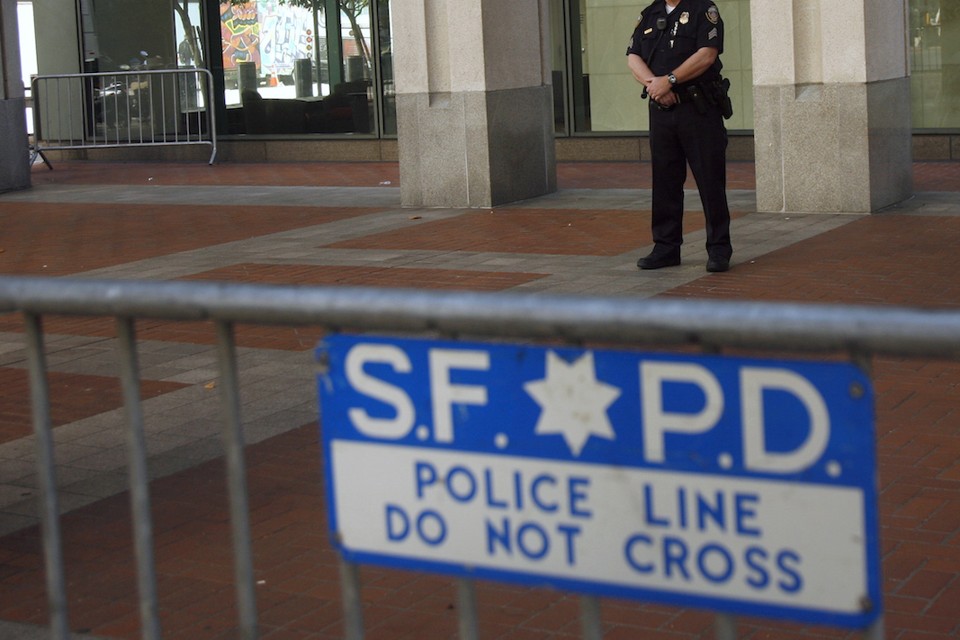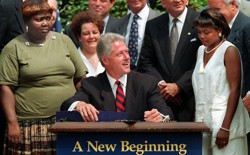88m3
Fast Money & Foreign Objects

Robert Galbraith / Reuters
How many police officers are bigots who patrol their beats, guns on their hips, with animus toward blacks, Hispanics, and other disproportionately abused groups, even as prosecutors, judges, and juries assign unusual credibility to their claims?
San Francisco officials were forced to ponder that question last year when an investigation revealed that five veteran cops were texting virulently racist messages to each other. “My office is conducting an immediate assessment of every prosecution within the past ten years where these officers were involved,” San Francisco District Attorney George Gascon said. Beyond that, much of the response was typical.
Police officials declared that the behavior, while abhorrent, was confined to a very few officers, an “old guard” that did not represent the general culture in the department.

The End of Welfare as We Know It
But reformers like public defender Jeff Adachi warned that the problem was deeper. “He called for the department to institute a 10-point plan to wring out racist and homophobic biases in the department,” theLos Angeles Times reported, quoting him as saying, “A person does not become a racist overnight. These were officers who in some cases had over a decade of service. We need to look at all of them.”
Skip ahead to this week.
“San Francisco police officers sent dozens of racist and homophobic text messages in the past several months, even as another group of officers was being investigated by prosecutors for having traded similar messages,” the New York Times reports. The newly disclosed texts include “derogatory references to blacks, Asians, lesbians, gays and transgender people,” and come as the federal government investigates “complaints that some officers routinely behave in a racially biased manner.”
The San Francisco Chronicle explains that the texts emerged during a probe of still more police misdeeds:
District Attorney George Gascón said a “substantial number of racist and homophobic text messages” emerged during a recent criminal investigation, which Police Chief Greg Suhr identified as the sexual assault probe of a Taraval Station officer, Jason Lai, that began last year.
The messages, which allegedly included use of the racial slur “n—” and derogatory comments toward the LGBT community, were exchanged among at least four officers, Suhr said, including Lai and Lt. Curtis Liu, who also worked at Taraval but retired after being accused of obstructing the rape inquiry. Gascón differed with Suhr, saying at least five officers had exchanged the messages. He said the messages were exchanged on the officers’ personal cell phones, but that it had not been determined if the texts were sent and received while the officers were on duty.
Just as cell phone cameras and YouTube have exposed acts of police brutality and murder that many would scarcely believe if they couldn’t see them for themselves, more text messages from the smart phones of cops are making it undeniable that the rot in police culture, while not total, spreads farther than many would otherwise concede. And that includes people high in the criminal justice system—the district attorney speaking out against this rot used to be head of the SFPD:
George Gascón, the city’s district attorney, said that the text messages were a worrying sign that the department had a problem with racism and homophobia that was more ingrained than investigators had anticipated. Especially concerning, Mr. Gascón said, was that the officers involved in the new case were sending offensive texts even as the city investigated 14 of their colleagues last year for sending and receiving similar messages.
“This indicates some significant and deeper problems within the department,” said Mr. Gascón, who is a former San Francisco police chief.
The New York Times goes on to report that the president of the San Francisco Police Officers Association “condemns the appalling racist behavior committed by a handful of officers.” Yet what happened to the police officers from the last texting scandal? “The Police Department’s effort to dismiss some of those officers was later overturned by a Superior Court judge, who said the department had failed to act within a one-year statute of limitations,” says the newspaper. In other words, thanks to a contract provision negotiated by the police union, more bad cops are on the street, making the city a less just place and making it harder for good cops to do their jobs.
The San Francisco Police Officers Association could waive the statute of limitations in future contracts. Or it could come out in favor of a one-year statute of limitations in criminal matters that affect civilians, if it has an earnest, principled belief that punishments after one year are unfair. I strongly suspect that it will do neither.
Over decades, most good cops have proven themselves unwilling or unable to do what it takes to reform a culture with elements so toxic that it undermines the rule of law, public trust in the police, civil liberties, and the safety of cops who do their jobs well. Police officers with evidence of open bigots operating in their departments need to do the right thing, even if anonymously.
Change has to start somewhere.
The San Francisco Police Department's Bigotry Problem